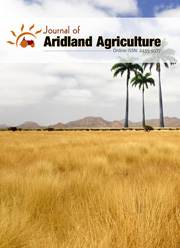Irrigation with municipal wastewater as a suitable solution for safflower cultivation in arid regions
DOI:
https://doi.org/10.25081/jaa.2021.v7.7245Keywords:
Fertilizer, oil, safflower, wastewater, yieldAbstract
In order to study the effect of different manure and chemical fertilizer levels on qualitative and quantitative characteristics of safflower in the condition of irrigation with municipal wastewater, an experiment was conducted as split plot basis of randomized complete design in Lakhshah region locate in Zahedan city, Iran. The treatments were comprised of two levels of irrigation, W1= Well water and W2= Treated wastewater, in main plots and sub plots consisted of F1: control (without consumption of manure and chemical fertilizer), F2: Recommended manure, F3: Half of recommended manure and chemical fertilizer (N, P and K), and F4: Recommended chemical fertilizer (N, P and K). The results showed that Treatment of treated wastewater had a positive and significant influence on all yield components, and the most influence was shown on 1000 seed weight. Also, irrigation with wastewater significantly increases the dry and fresh yield and grain yield of safflower than ordinary water. Among the fertilizer treatments, complete treatment of chemical fertilizer N, P and K had the greatest effect on increase of yield and grain yield components. In this experiment, water treatment hadn’t significant effect on accumulation of Cr, pb, Fe and Mn in safflower grain, and soil. While, fertilizer treatment had only a significant influence on the accumulation of Fe and Mn in safflower grain, but between these treatments wasn’t saw any significant difference on the accumulation of Cr and pb. In general, the results of this experiment showed that irrigation with wastewater and application of complete fertilizer with manure is recommended.
Downloads
Published
How to Cite
Issue
Section
Copyright (c) 2021 Somayeh Baghani, Issa Piri, Abolfazl Tavassoli, Mohammad Reza Naghavi, Fatemeh Rastegaripour

This work is licensed under a Creative Commons Attribution-NonCommercial 3.0 Unported License.





 .
.